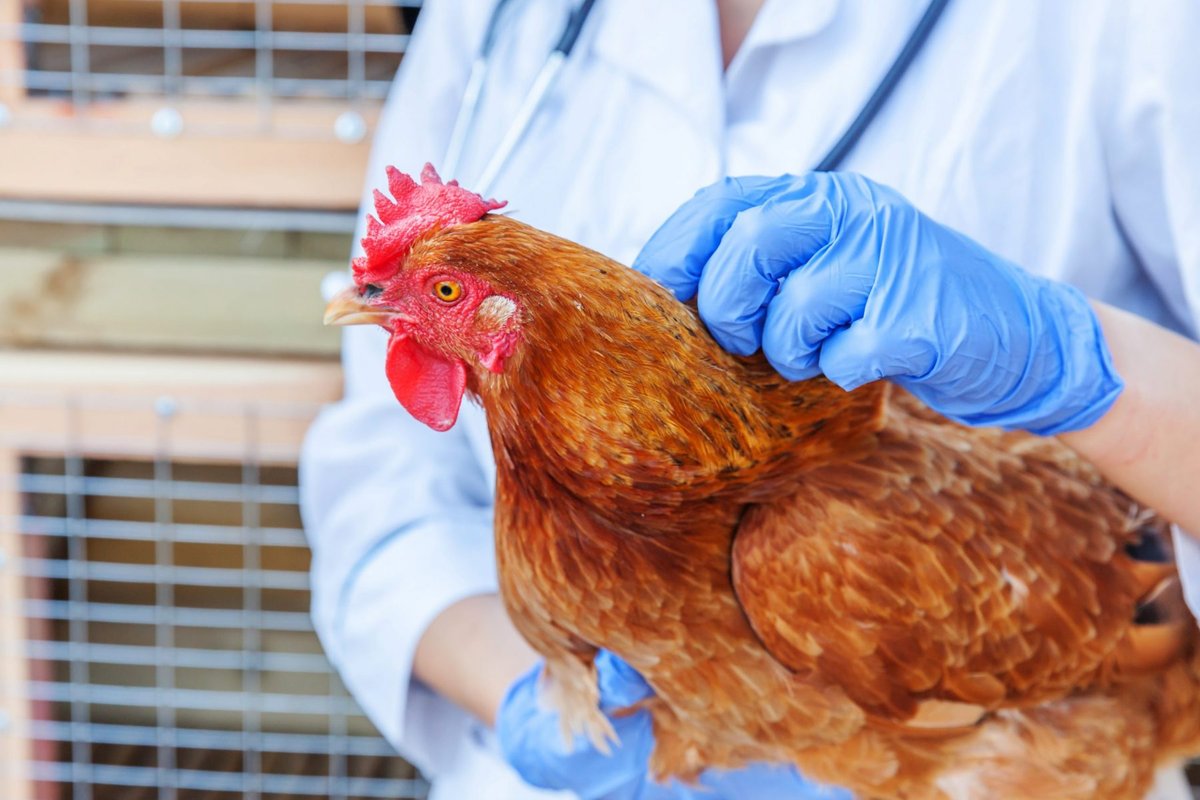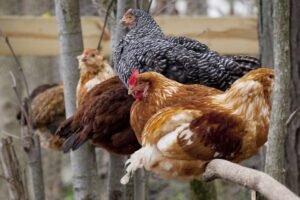Hearing a sneeze, cough, or gurgle from your chicken coop is a sound that can make any flock owner’s heart sink. Is it just a bit of dust, or the start of something serious? This guide is designed to help you identify the potential causes, know what immediate steps to take, and understand the crucial difference between supportive home care and necessary veterinary treatment for your poultry.
IMPORTANT: Veterinary Disclaimer
This guide is for informational purposes only. A respiratory illness in a flock can be serious and highly contagious. For an accurate diagnosis and treatment plan, especially concerning antibiotics, you must consult a qualified veterinarian. Using antibiotics without a proper diagnosis can be ineffective, dangerous, and illegal.
First Steps: What to Do When You Notice a Sneeze
When you first notice that my chicken is sneezing, don’t panic. Take these immediate and critical steps to assess the situation and protect your entire flock.
Recognize the Signs of Trouble
While a single sneeze might be nothing, a combination of symptoms is a strong indicator of a developing issue. Look for a cluster of these signs, which often point to a respiratory problem:
- Nasal or Eye Discharge: A clear, bubbly, or thick mucus coming from the nostrils or eyes. You might see bubbles in the corner of their eyes or crusty buildup around the beak.
- Wheezing, Coughing, or Gurgling: Abnormal sounds from the chest or throat, especially when the chicken is resting. This is a sign of mucus buildup in the respiratory system.
- Facial Swelling: A puffy, swollen face or wattles, often a sign of a more serious bacterial infection like Infectious Coryza.
- Lethargy and Loss of Appetite: The bird is less active, hunched over, and shows little interest in food or water. For a deep dive on this issue, check out our guide on Lethargy.
- Head Shaking: An affected bird may frequently shake its head to try and clear its nasal passages.
Setting Up a Quarantine Pen
Immediate isolation is the most crucial step you can take to prevent the spread of a contagious illness. A proper quarantine pen, or “hospital” should be completely separate from your main coop and at least 14 feet away.
- Separate Everything: The quarantine area needs its own set of feeders, waterers, and cleaning tools. This is a critical biosecurity measure to prevent cross-contamination.
- Provide Comfort: The space should be clean, quiet, and warm, with a safe heat source to help the sick bird conserve energy for healing. A heat lamp is a good option, but ensure the bird can move away from it if it gets too hot.
- Monitor and Record: Keep a notebook to track symptoms, changes in behavior, food and water intake, and any treatments you administer. This information is invaluable for a veterinarian.
Once you have the affected chicken safely quarantined, you can move on to the next step: examining their environment for any potential triggers.
What Causes a Chicken to Sneeze?
The sneeze is a symptom of a problem with the respiratory system. The cause can be as simple as an irritant in the air or as serious as a contagious illness. Making a clear distinction can help you decide your next steps.
Common Environmental Irritants
These are the simple, non-contagious causes of sneezing that are often easy to fix with proper management.
- Dust: Feathers, certain types of bedding (like fine sawdust), and some feed can create dust that irritates a chicken’s delicate respiratory system, leading to sneezing and minor nasal discharge. This is especially common when birds are actively dust bathing.
- Ammonia Buildup: Poor ventilation and wet, dirty bedding can lead to a buildup of ammonia gas. This gas has a sharp, acrid smell and can burn a chicken’s respiratory system, causing severe irritation. If you can smell ammonia in the coop, the levels are too high.
- Drafts: A cold draft blowing directly on a roosting chicken can cause chilling and minor respiratory system irritation. Drafts are different from good ventilation, which moves air without creating a direct breeze on the birds.
- Aspiration: A chicken may accidentally inhale food particles or water while eating or drinking, which can cause them to sneeze or cough to clear their airways.
Infectious Illnesses
If the sneezing is persistent, affects multiple birds, or is accompanied by other serious symptoms, an infectious illness is a serious concern. Sneezing is a primary symptom of several contagious bacterial and viral poultry diseases. These can be transmitted through direct contact, shared food and water, or even through the air.
Understanding the root cause is the key to an effective response, whether it’s a simple cleaning of the coop or a call to the vet. This distinction is critical because treating a viral issue with ineffective antibiotics can harm your bird and contribute to dangerous antibiotic resistance.
Now that you’re aware of the most common causes and illnesses, let’s explore what you can do to support your sick bird’s recovery.
A Guide to Common Respiratory Illnesses in Chickens
This section provides a brief overview of some of the most common respiratory diseases that cause chicken sneezing treatment to be necessary. A proper diagnosis by a veterinarian is always recommended, as it is difficult to identify the disease without laboratory testing.
Mycoplasma gallisepticum (MG or CRD)
Also known as Mycoplasma gallisepticum or Chronic Respiratory Disease (CRD), this is a widespread bacterial infection. Symptoms often include sneezing, bubbly eyes, and a chronic nasal discharge. While it can be managed with antibiotics, it is rarely cured and can make birds susceptible to other infections. The disease can be passed vertically from the hen to the chick through the egg, which is a major reason it is so common.
Infectious Bronchitis (IB)
Infectious Bronchitis is a highly contagious viral disease. In addition to sneezing, you’ll often hear distinct gurgling sounds and see birds gasping for air. It spreads extremely quickly and can severely impact egg production and quality, causing misshapen, soft-shelled, or wrinkled eggs. The virus can also damage the oviducts of young chickens, leading to a permanent inability to lay eggs.
Infectious Coryza
This is a bacterial infection that presents with severe symptoms, including a foul-smelling nasal discharge and pronounced swelling of the face and wattles. The swelling can be so extreme that it seals the eyes shut. It spreads rapidly through an entire flock and can lead to a significant drop in egg production and death. This is often an “all-in” infection, meaning all birds will show symptoms at once.
The Importance of a Proper Diagnosis
You must get a proper diagnosis to know the difference between a bacterial and viral illness. Why? Because antibiotics are completely ineffective against a viral disease like Infectious Bronchitis. Giving antibiotics when they aren’t needed is not only a waste of money but can contribute to dangerous antibiotic resistance in both birds and humans. A veterinarian can perform a simple swab or send a sample to a lab to confirm the specific pathogen.
Now that you’re aware of the most common causes and illnesses, let’s explore what you can do to support your sick bird’s recovery.
How to Treat a Respiratory Infection in Chickens
The appropriate treatment for respiratory infection in chickens depends entirely on the cause. The following are steps to provide comfort and, if needed, medical intervention.
Supportive Care at Home
Whether the illness is bacterial or viral, these steps are essential supportive care to help the bird recover.
- A Clean, Warm, Stress-Free “Hospital”: Keep the quarantined chicken in a clean and quiet space. A heat lamp or other safe heat source is crucial, as a sick bird will have trouble regulating its own body temperature.
- Boost Hydration with Electrolytes: Dehydration is a major concern with sick birds. Add electrolytes to their clean, fresh water to combat it and help them recover from stress. You can find commercial electrolytes specifically for poultry or make a simple homemade solution: 1 tablespoon of sugar, 1 teaspoon of baking soda, and 1 teaspoon of salt per gallon of water. (And always provide a separate waterer with plain water, giving them a choice.)
- Encourage Eating: A sick bird won’t eat if it doesn’t feel well. Offer tempting, high-protein foods like scrambled eggs, mealworms, or a mash of their regular feed mixed with water to make it more palatable and easier to digest.
Natural and Herbal Support
These methods are for soothing symptoms and offering supportive care; they are not cures.
- Herbs: Herbs like fresh oregano, thyme, and sage have natural antimicrobial properties. You can chop them finely and add them to the feed or hang bunches in the coop.
- VetRx: VetRx is a popular topical treatment that can provide relief from respiratory symptoms. How to use VetRx for respiratory infection is typically to add a few drops to their water as a vapor or to rub a small amount on the chicken’s wattles or under their wings to help open their airways. This product helps with the symptoms but does not treat the underlying infection.
The Role of Antibiotics (Prescription Veterinary Treatment)
You cannot legally or safely give a chicken sneezing treatment with antibiotics without a veterinarian’s prescription and a clear diagnosis. Antibiotics do not work on viral infections and are only effective against bacterial ones.
Antibiotics for chicken respiratory infection prescribed by veterinarians include Tylan (Tylosin) and Baytril (Enrofloxacin). It is critical to understand that you cannot legally or safely purchase or give amoxicillin to chickens without a vet’s prescription and dosage instructions, as improper use can be harmful to the chicken and create antibiotic resistance in your flock.
Knowing what a sick bird needs in the short term is one thing, but preventing the illness in the first place is the most important part of being a good chicken keeper.
Prevention: The Best Medicine for a Healthy Flock
Proactive care is always the best way to keep your flock healthy and prevent my chicken is sneezing from becoming a frequent issue.
The Three Pillars of Prevention
- Biosecurity: This is your first and best line of defense.
- Quarantine New Birds: Always quarantine new birds for at least 30 days before introducing them to your main flock.
- Control Traffic: Restrict visitors from your coop area. If you must have visitors, ask them to use a footbath or wear disposable shoe covers to prevent outside germs from entering.
- Use Designated Equipment: Do not share tools, waterers, or feeders with other chicken keepers. If you must, thoroughly clean and disinfect them first.
- Excellent Ventilation:Proper airflow is the key to preventing most respiratory issues.
- Ventilation vs. Draft: Ventilation allows fresh air to circulate without causing a cold draft, which can chill your birds.
- Design for Airflow: Your coop should have vents located high up to allow warm, moist, ammonia-filled air to escape while fresh, cool air comes in from lower vents.
- Clean and Dry Bedding: Regularly clean your coop and provide fresh, dry bedding. This prevents the buildup of harmful ammonia. A good practice is the “deep litter method,” where you add new bedding on top of old bedding, allowing the manure to compost safely and prevent moisture buildup.
Vaccination as a Preventative Tool
For certain diseases like Infectious Bronchitis and Infectious Coryza, there are vaccines available. A poultry veterinarian or local extension office can provide information on which vaccines are appropriate for your area and a schedule for their administration. This is especially important if you are raising a large flock or are in an area with known outbreaks.
Respiratory Health FAQ
This section addresses common questions about chicken sneezing treatment.
What should I do if my entire flock is sick?
If multiple birds are showing symptoms, it’s a clear sign of a contagious illness. Isolate the most severely affected birds and contact your veterinarian immediately. A large-scale outbreak requires a professional diagnosis and treatment plan.
Can a sneezing chicken pass it to my other animals?
Infectious poultry illnesses are generally species-specific and won’t be passed to your dog or cat. However, you can carry the germs on your shoes or clothing, which is why proper biosecurity so important.
Can I give a chicken human cold or flu medicine?
No. Human medications are not formulated for chickens and can be fatal. Never give your chicken over-the-counter flu or cold medicine.
Why is apple cider vinegar not a treatment for respiratory infection?
While a small amount of ACV can support general gut health, it is not a treatment for respiratory infections. For a sick chicken, focus on clean water with electrolytes and ensuring a stress-free environment.
How do I know if my chicken is struggling to breathe?
Signs of difficulty breathing include open-mouth breathing, gasping for air, wheezing, and a gurgling sound when they inhale or exhale. If a chicken shows these signs, it’s a medical emergency.
Conclusion: A Proactive Approach to Respiratory Health
A sneeze from your flock is a warning sign that something is amiss. Your immediate response—to observe, isolate, and check the environment—is critical. While providing supportive care at home can help, you should not hesitate to contact a veterinarian if the symptoms worsen or persist. Remember that good management and quick action are the keys to maintaining a healthy, happy flock.

Oladepo Babatunde is the founder of ChickenStarter.com. He is a backyard chicken keeper and educator who specializes in helping beginners raise healthy flocks, particularly in warm climates. His expertise comes from years of hands-on experience building coops, treating common chicken ailments, and solving flock management issues. His own happy hens are a testament to his methods, laying 25-30 eggs weekly.



